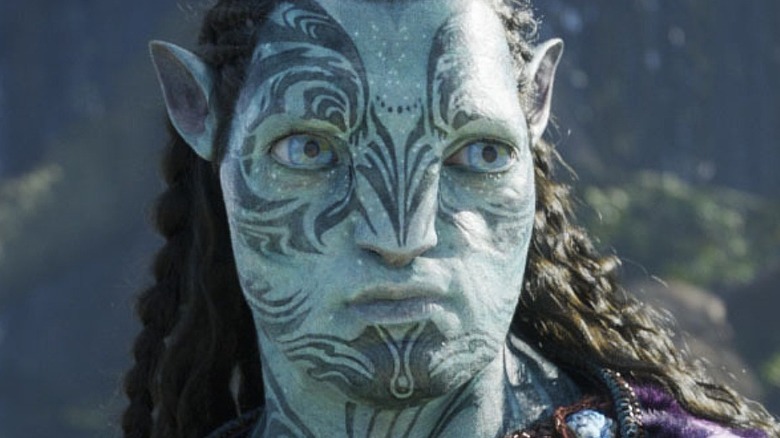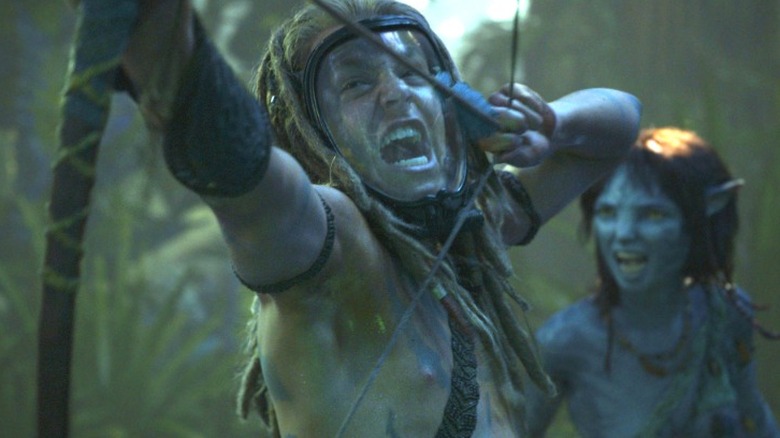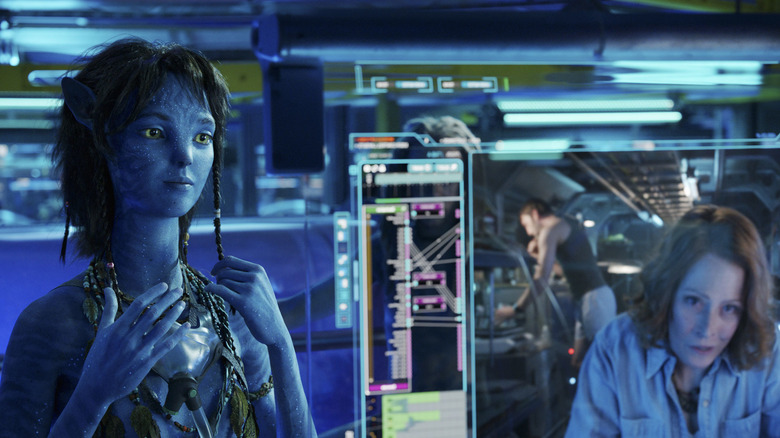The One Ethical Question Everyone Should Be Asking After Watching Avatar: The Way Of Water
Contains spoilers for "Avatar: The Way of Water"
It's safe to say that "Avatar" is a far cry from James Cameron's days directing "Piranha II: The Spawning." Not only was the 2009 film's success historic due to its box office cume, but it also featured new and groundbreaking special effects and 3D technology, which were evident in the world of Pandora. It felt like a world none of us had ever seen before, with its colorful array of creatures, unique customs, and inspired visuals that proved to be a sci-fi feast for the eyes. But as outlandish as the world of Pandora appears on the surface, Cameron and company knew how to ground it in reality to have audiences identify more with the motion-captured heroes and reflect on issues within our own society. Sure, the subtlety of many of its discrimination and environmental allegories are as subtle as a "Captain Planet" cartoon at times, but nevertheless, it gave something for viewers to chew on after the nearly three-hour venture.
So when diving into the film's long-awaited sequel, "Avatar: The Way of Water," that social commentary would undoubtedly be coming along with it, especially with the social and political changes the world has seen in the 13 years between releases. While the environmental and imperialism metaphors are here once again, perhaps more crucial to "The Way of Water" is something deeper and more timely in examining how one's identity plays into the greater conflict.
To be or not to be Na'vi, that is the question
"Avatar: The Way of Water" introduces Jake Sully (Sam Worthington) and Neytiri's (Zoe Saldaña) biological children, Lo'ak (Britain Dalton), Neteyam (Jamie Flatters) and Tuk (Trinity Jo-Li Bliss) and their two adopted children Kiri (Sigourney Weaver) and Miles "Spider" Socorro (Jack Champion). The majority of the film explores the kids and their place in the ongoing conflict between the Na'vi and humans. While Sully's biological children, most notably Lo'ak and Neteyam, constantly try to prove themselves as great fighters like their parents, it is Kiri and Spider who arguably have the greatest dilemma.
Kiri is the biological daughter of the deceased Dr. Grace Augustine (Weaver), who, although naturally born as a Na'vi from Augustine's avatar, remains conflicted over her place in Na'vi society while yearning to know more about her mother. Spider sees a similar scenario in that he is the son of the film's antagonist, Colonel Miles Quaritch (Stephen Lang), despite growing up with and identifying as Na'vi. But as he is forced to tag along with Quaritch for the majority of the film to help locate Sully and his family, he remains conflicted on which side to stay loyal to. Together, both characters mirror one another as they struggle with their identities while trying to figure out where they fit in as Na'vi people or if they do at all. Eventually, how these characters see themselves individually makes its way into the grander story being told.
How we identify determines how we treat the environment
Just as the first film comments on our treatment of the forest landscapes around us, it's probably not rocket science to figure out what natural environment "Avatar: The Way of Water" chooses to highlight. But the film's examination of how we should protect our seas also blends with its themes about identity. Kiri is perhaps the most prominent example of this, as the teenager is established early on as having an especially close bond with the natural world around her that's shrouded in mystery.
When she and Sully's family make it to the Metkayina tribe and begin learning their ways, Kiri is once again at one with her environment, connecting with the sea creatures and world profoundly. Her abilities come in handy towards the end, where she communicates with the sea life to help save her family from certain death in Quaritch's ship. Her love for the environment around her teaches us how to respect this resource better and how the Na'vi people can learn from her to settle this conflict. Similarly, Spider's love for both the Na'vi and his antagonistic father could help change the viewpoints of everyone involved in the war. In the end, James Cameron's film acts as more than a simple environmental message, but an examination of using your unique viewpoint of the world to fight for what's right and how that can help turn the tide.


